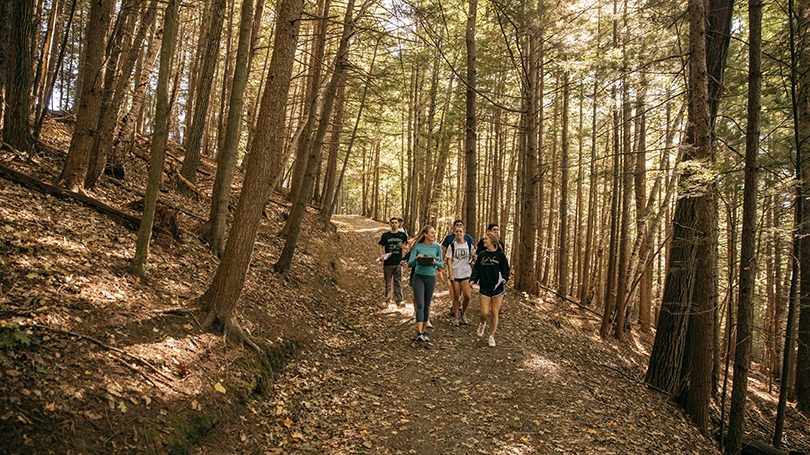
- About
- Departments
- Construction on Campus
- Service Requests
Back to Top Nav
Back to Top Nav
The work to remove the unhealthy trees will begin Monday, Jan. 28.
Due to a common fungal disease, some of the pine trees in Pine Park must be removed, according to Frank Roberts, the associate vice president of Facilities Operations & Management. The trustees of Pine Park, the town of Hanover, and Dartmouth jointly agreed to remove the diseased trees.
“A substantial number of diseased pine trees in the Cathedral Aisle area of Pine Park are dead and need to be removed,” said Roberts. “Removal will help prevent the spread of disease and reduce the risk of accidents (dead limbs/trees falling) on the hiking trails. After further reviewing the condition of and number of the trees over the past month, we are moving quickly due to safety considerations and we have the opportunity to get the work done this winter when the ground is frozen and snow covered, which will minimize damage to the park and golf course during the removal process.”
The work area will be approximately 12 acres along both sides of Cathedral Aisle trail. Within the work area, pine trees that are dead or in poor health and likely to live only another few years will be cut down and, depending on their condition, will be removed from the park. Hardwoods trees, healthy pine trees, and hemlock trees will be preserved wherever possible within the work zone.
Work at the site will begin Monday, Jan. 28, and last two to three weeks. None of the work will take place on weekends. During this operation, there will be no parking along Hilton Field Lane, including in the College parking lot across from DOC House. The sledding hill and trail system along west side of Pine Park—Cathedral Aisle, River Front, and Esker trails—will remained closed to the public during the work period. The trail adjacent to Girl Brook will remain open.
Pine Park consists of about 95 acres of woodland located just north of the College campus and can be accessed through the Hanover Country Club and from Rope Ferry and Occom Ridge roads. The park is owned by the Pine Park Association, a voluntary nonprofit organization that dates back to 1900. Hanover’s first natural area permanently preserved as a park, the park functions today as the town’s “central park for the enjoyment of walkers, joggers, skiers, and many others,” according to the Hanover Conservancy website
The town of Hanover and Dartmouth have shared responsibility for the management of the park. Forestry management practices to prevent the spread of the disease, as well as restoration practices, will be reviewed and discussed in the near future by the town of Hanover, Dartmouth, and the Pine Park Association.
During a recent walk through Pine Park, College Arborist Brian Beaty noticed dead pine trees along either side of the Cathedral Aisle Trail. Beaty contacted Kyle Lombard, the Forest Health Program coordinator with the New Hampshire Division of Forests and Lands, to examine the trees and make a recommendation. It was determined that the trees had died from a combination of needle cast outbreaks and a subsequent attack by root rot and red turpentine beetles.
Rhizosphaeara needle cast is a common fungal disease that affects conifers such as spruce, Douglas fir, western hemlock, and eastern white pine. One of the major factors leading to this condition is the high density of large, aged pine trees. Their competition for sunlight creates small crowns and can leave the trees in poor health.
Find more information about the Pine Park project on the Campus Services website.